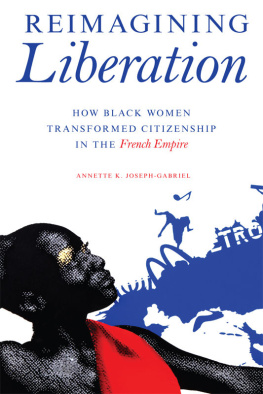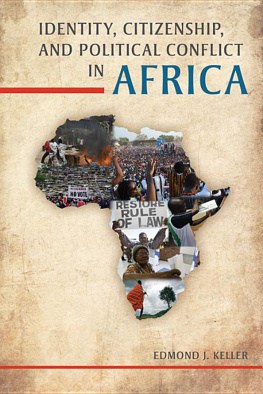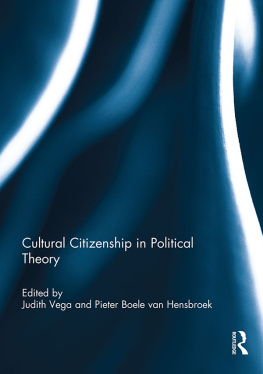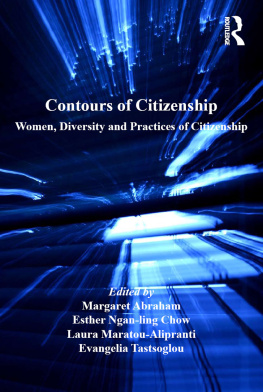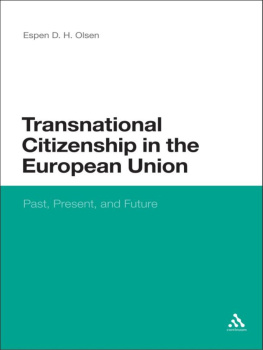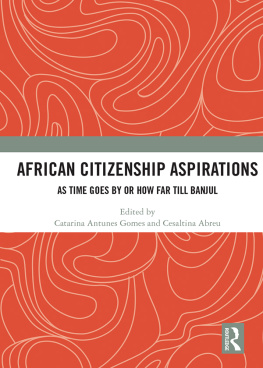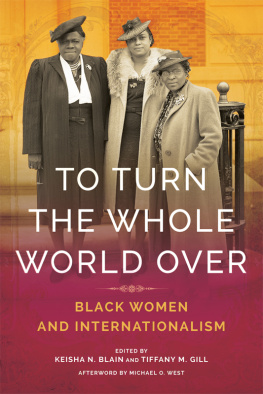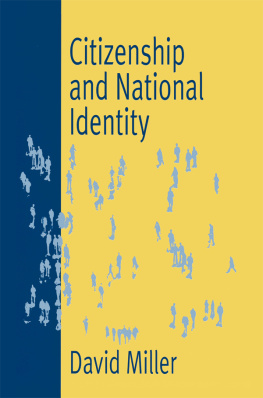Reimagining Liberation
THE NEW BLACK STUDIES SERIES
Edited by Darlene Clark Hine
and Dwight A. McBride
A list of books in the series appears
at the end of this book.
Reimagining Liberation
How Black Women Transformed
Citizenship in the French Empire
ANNETTE K. JOSEPH-GABRIEL
2020 by Annette K. Joseph-Gabriel
All rights reserved
Publication of this book was supported by funding from the University of Michigan Office of Research and the College of Literature, Science, and the Arts.
Portions of chapter 1 previously appeared as Beyond the Great Camouflage: Haiti in Suzanne Csaires Politics and Poetics of Liberation in Small Axe Vol. 20 No. 2, July 2016, pp. 113. Portions of chapter 6 previously appeared as Feminist Networks and Diasporic Practices: Eslanda Robesons Travels in Africa in To Turn the Whole World Over: Black Women and Internationalism , ed. Keisha N. Blain and Tiffany M. Gill (University of Illinois Press, 2019).
Library of Congress Cataloging-in-Publication Data
Names: Joseph-Gabriel, Annette K., author.
Title: Reimagining liberation : how Black women transformed citizenship in the French empire / Annette K. Joseph-Gabriel.
Description: Urbana : University of Illinois Press, [2020] | Series: The new Black studies series | Includes bibliographical references and index.
Identifiers: LCCN 2019025426 (print) | LCCN 2019025427 (ebook) | ISBN 9780252042935 (cloth) | ISBN 9780252084751 (paperback) | ISBN 9780252051791 (ebook)
Subjects: LCSH : Women, BlackFrench-speaking countrieBiography. | Women, BlackPolitical activityFrench-speaking countriesHistory20th century. | Anti-imperialist movementsFrenchspeaking countriesHistory20th century.
Classification: LCC HQ 1163 . J 67 2020 (print) | LCC HQ 1163 (ebook) | DDC 305.48/8960944dc23
LC record available at https://lccn.loc.gov/2019025426
LC ebook record available at https://lccn.loc.gov/2019025427
For Laura
and Jeannette
Contents
Acknowledgments
I am grateful for the incredible support I received while writing this book. I owe an immense debt of gratitude to Tracy Sharpley-Whiting for her guidance and mentorship at all stages of this project and beyond. I am grateful to Stphane Robolin, in whose courses this journey began and who has remained a generous mentor over the years. Many other teachers along the way taught me to ask necessary questions and to seek answers both within and beyond the genres and disciplines that are most readily legible to the academy. To these teachersRobert Barsky, Edan Dekel, Trica Keaton, Vera Kutzinski, Paul Miller, Kenda Mutongi, Tiffany Patterson, Kashia Pieprzak, Neil Roberts, Virginia Scott, Evie Shockley, and Shanti SinghamI am most grateful.
Archival discoveries are often thanks to archivists deep knowledge of their collections. For showing me the way, I extend sincere thanks to the archivists at the Archives dpartementales de la Martinique, the Archives nationales doutre-mer, the Bibliothque national de France, the Bibliothque littraire Jacques Doucet, the Fondation Charles de Gaulle, the Archives du Snat, the Archives dpartementales des Bouches-du-Rhne in Aix-en-Provence and Marseille, and the Moorland-Spingarn Research Center. Support from the Carrie Chapman Catt Prize for Research on Women and Politics was invaluable for visiting some of these archives.
In preparing this work, the feedback I received from anonymous reviewers helped to shape my thinking. I am especially grateful to anonymous Reviewer C, whose thorough reading and comments showed me more clearly the black feminist shape of this work. I extend my sincere thanks to Dawn Durante for believing in this book from the start and for being such a wonderful editor.
The support I received from colleagues has been invaluable. Thank you, Keisha Blain and Ashley Farmer, for daily writing check-ins that kept my butt in the seat and for your scholarship on black women that has served as a model for my work. Thank you to Jarrod Hayes for reading the manuscript (twice!) and to Rob Watson for valuable feedback on early versions of chapters. Petal Samuel and Kathleen DeGuzman, I am so grateful for your insightful comments on countless drafts and for blowing me away every day with your brilliance as Caribbeanists and your kindness and generosity as friends. I will always cherish the newbie crew: Adi, David, Desiree, Julie, Kadian, Kevin, and Stephanie. Your scholarship and activism remain a guiding light. Thank you to my RLL colleagues at the University of Michigan, Ann Arbor, whose welcome, friendship, and support I truly appreciate.
Thank you, Yemisi Cookey and Michelle Wilson, for your friendship and reminders to be human. I am so grateful to the Pecome family and to Manette Joseph-Gabriel for making Martinique my second home. I thank my grandparents Agnes, Laura, and Jonathan for the work they did in creating a better, more just world. To my father, Andy; my mother, Jeannette; and my brothers, Andy Jr. and Jean, thank you for immeasurable sacrifices, for making fifteen years away easier to bear and for bridging the distance with love and laughs. Steeve, my friend, my love, my archive slayer, my travel partner, the calm to my chaos, thank you will never be enough. This, like everything, is for you. May the rest of this journey hold nothing but light and happiness for you.
Reimagining Liberation
Prologue
I became a French citizen in 2017 as I was writing this book. There was no pomp and circumstance, no singing of the Marseillaise in a tearful ceremony attended by joyful relatives eager to welcome me into the folds of France. None of my relatives are French. The plain white envelope that arrived in the mail from the French consulate contained a red, white, and blue folder bearing the image of Marianne swinging the tricolor, an image taken from Eugne Delacroixs famous nineteenth-century painting Liberty Leading the People. Inside the folder, the form letter bearing Franois Hollandes signature announced my attachment to the long history of a France that, over centuries, has welcomed women and men who have recognized themselves in its values: liberty, equality, fraternity, secularism. The well-known tripartite motto of liberty, equality, fraternity that began as the rallying cry of the French Revolution sported a new addition in this repackaging of national values for an age when secularism was no longer brandished in the face of the Catholic clergy with as much conviction as in the revolutionary era, and when Islam now constituted a key site of contestation over who could really be French. The rest of the folders contents illuminated the governments view on the necessary ingredients for becoming a good citizen: the official scores of the mandatory language exam proved that I knew enough French to be French. Glossy A4 sheets printed with the words to the Marseillaise (finally!), the constitution of the French Fifth Republic, and the 1789 Declaration of the Rights of Man and of the Citizen were testaments to the specific elements of French history that I could now apparently claim as mine. This last document would be a useful point of departure for my analysis of citizenship in this book.
Of the plethora of administrative documents that came with my acquisition of French citizenship, two in particular stood out as emblematic of the comfort and discomfiture that this new status brought. The first was a brochure informing me that if I had not responded to the consulates initial offer regarding the Gallicization of my name, it was not too late to do so. Anyone who has been through a French administrative process will be struck, as I was, by the rarity of second chances. An entire dossier could be unceremoniously thrown out or, at best, returned to the applicant over a typo. To offer a second chance at modifying the spelling of my name, then, is to underscore a need to render legible to the French state those names, identities, and selves deemed illegible.
Next page
